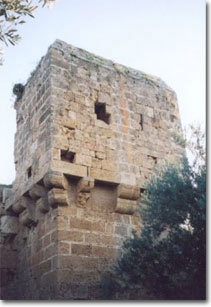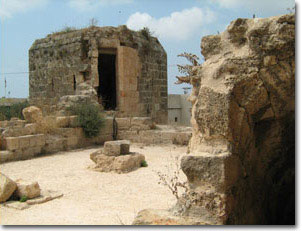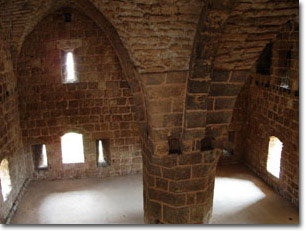|
Qalaat
Yahmur (Yahmur Castle):  12 km south east of Tartous; there are sites in the environs earlier
than the Crusaders, including some Roman tombs. It was probably not
fortified until the tenth century. Still she's standing to show the
greatness of this land facing the invaders and standing up for victory. 12 km south east of Tartous; there are sites in the environs earlier
than the Crusaders, including some Roman tombs. It was probably not
fortified until the tenth century. Still she's standing to show the
greatness of this land facing the invaders and standing up for victory.
The Byzantines under the Emperor Nicephorus (who reinstated Byzantine
authority in this area, 3 centuries after the Arab conquest) built the
first fortification. It is not clear how much of the fortress belong
really to the Crusader period. The early Crusader fortress was in 1177
transferred to the Hospitables who had been given the job of insuring
the defense of the hinterland of Tartous. They improved in the
Byzantine effort with their skills in fortification and defensive
technology. The architecture looks typically Crusader in its present
appearance. Chastel
Rouge (Red Castle) temporarily fell to the Muslims in 1188 during
Saladin's campaign in the area. The Crusaders recovered it and it
remained in their hands for another century. It fell, in the end, in
1289, two years before Tartous, to the forces of the Mameluke Sultan,
Qalaun.  The keep, essentially a fortified watch-tower with a surrounding wall,
was built as part of the outer defenses of Tartous, complementing the
larger fortified points in the area, Safita (Castle Blanc) and Areimeh
Castle. The three points were in line of sight, enabling contact by
signal fires. The keep, essentially a fortified watch-tower with a surrounding wall,
was built as part of the outer defenses of Tartous, complementing the
larger fortified points in the area, Safita (Castle Blanc) and Areimeh
Castle. The three points were in line of sight, enabling contact by
signal fires.
The
construction is basic but solid, typical of Frankish work of the mid
12th century. It consists of stubby square tower with a lower room now
used for village cattle surrounded by outer wall obscured by modern
housing. Passing the tower, there's the lower chamber with the arched
vaults coming down to a central pillar. The upper storey is reached by
a staircase built into the north wall. The terrace gives a commanding
view of the countryside. 
|


